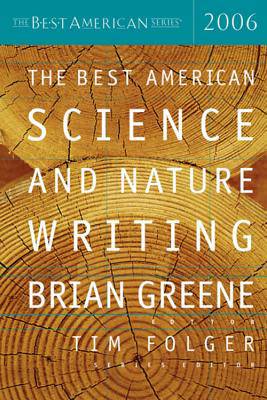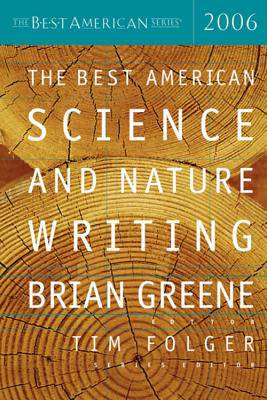
- Retrait gratuit dans votre magasin Club
- 7.000.000 titres dans notre catalogue
- Payer en toute sécurité
- Toujours un magasin près de chez vous
- Retrait gratuit dans votre magasin Club
- 7.000.0000 titres dans notre catalogue
- Payer en toute sécurité
- Toujours un magasin près de chez vous
29,95 €
+ 59 points
Description
In his introduction to The Best American Science and Nature Writing 2006, Brian Greene writes that "science needs to be recognized for what it is: the ultimate in adventure stories."
The twenty-five pieces in this year's collection take you on just such an adventure. Natalie Angier probes the origins of language, Paul Raffaele describes a remote Amazonian tribe untouched by the modern world, and Frans B. M. de Waal explains what a new breed of economists is learning from monkeys. Drake Bennett profiles the creator of Ecstasy and more than two hundred other psychedelic compounds -- a man hailed by some as one of the twentieth century's most important scientists. Some of the selections reflect the news of the past year. Daniel C. Dennett questions the debate over intelligent design -- is evolution just a theory? --while Chris Mooney reports on how this debate almost tore one small town apart. John Hockenberry examines how blogs are transforming the twenty-first-century battlefield, Larry Cahill probes the new science uncovering male and female brain differences, Daniel Roth explains why the programmer who made it easy to pirate movies over the Internet is now being courted by Hollywood, and Charles C. Mann looks at the dark side of increased human life expectancy. Reaching out beyond our own planet, Juan Maldacena questions whether we actually live in a three-dimensional world and whether gravity truly exists. Dennis Overbye surveys the continuing scientific mystery of time travel, and Robert Kunzig describes new x-ray images of the heavens, including black holes, exploding stars, colliding galaxies, and other wonders the eye can't see.Spécifications
Parties prenantes
- Auteur(s) :
- Editeur:
Contenu
- Nombre de pages :
- 320
- Langue:
- Anglais
- Collection :
Caractéristiques
- EAN:
- 9780618722228
- Date de parution :
- 11-10-06
- Format:
- Livre broché
- Format numérique:
- Trade paperback (VS)
- Dimensions :
- 140 mm x 213 mm
- Poids :
- 408 g

Les avis
Nous publions uniquement les avis qui respectent les conditions requises. Consultez nos conditions pour les avis.






